RV and travel trailer dealerships make a pretty penny on every sale they make. While we’ll talk more about just how much they stand to gain later on, knowing that most dealerships do quite well for themselves is why you should know how to negotiate a travel trailer purchase so that you can get a better price on your new adventure rig.
Negotiating for a better price is a great way to save money on your next travel trailer purchase.
Whether you’re buying directly from a dealership or negotiating with a private seller, there’s always room for a healthy discussion about what the trailer is really worth.
That being said, there’s an art to this kind of negotiation. And if you’re really interested in a certain travel trailer, pushing too hard for a lower price could dissuade the seller from making an agreement with you at all.
So, you need to know how to negotiate a travel trailer purchase with cunning and finesse.
But don’t worry! That’s exactly what we’re going to focus on today. So let’s dive into it!
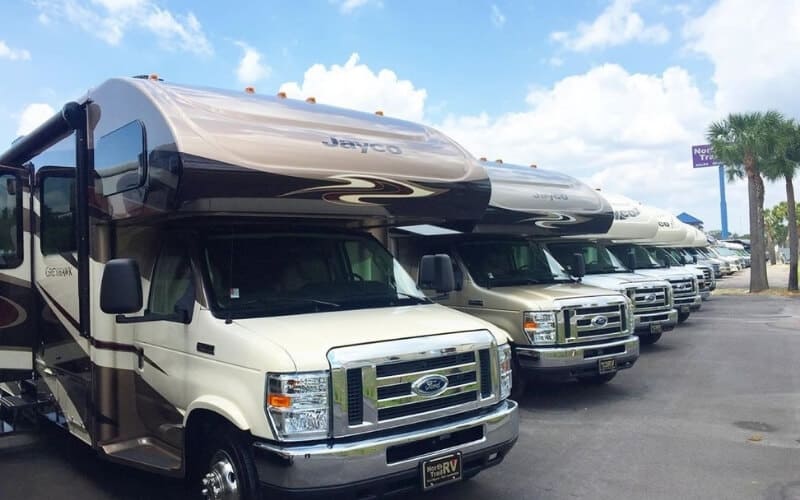
How To Negotiate A Travel Trailer Purchase
Many dealerships enjoy higher margins when they sell travel trailers compared to many other types of recreational vehicles.
This is partly due to the fact that they are considered ‘luxury vehicles’, but it also has to do with the fact that dealerships take advantage of increased consumer demand during the summer months.
Follow these RV Price Negotiation tips to getting the best price on your new travel trailer:
1: Narrow Down Your Choices
Walking onto a dealership’s lot or into their showroom can be very dangerous if you don’t already have some idea of the type of travel trailer you’re looking for.
It can be a major waste of time and can also put you at risk of getting sidetracked by a great sales pitch rather than focusing on what you really want in a new travel trailer.
That’s why the first key to a successful travel trailer negotiation is to narrow down your choices. Going in with an idea of three or four models that you want to look at will help you stay on track while at the dealership.
And it will also help you avoid wasting time with private sellers that are advertising trailers that don’t meet your needs.
A good way to see different trailer models without having a salesperson breathing down your neck is to visit RV and travel trailer trade shows.
These shows give you the freedom to walk through (and around) many different travel trailer models to get a better sense of what fits your style.
And it will also help you start to understand how much the trailer of your dreams might cost!
If you can’t (or don’t feel comfortable) attending these types of trade shows, most dealerships nowadays will offer virtual tours of their travel trailers online.
These virtual tours are the next best thing to physically walking through a trailer in-person.
And, in some cases, it could even be beneficial to rent a trailer you’re interested in to really see if you like it before buying.
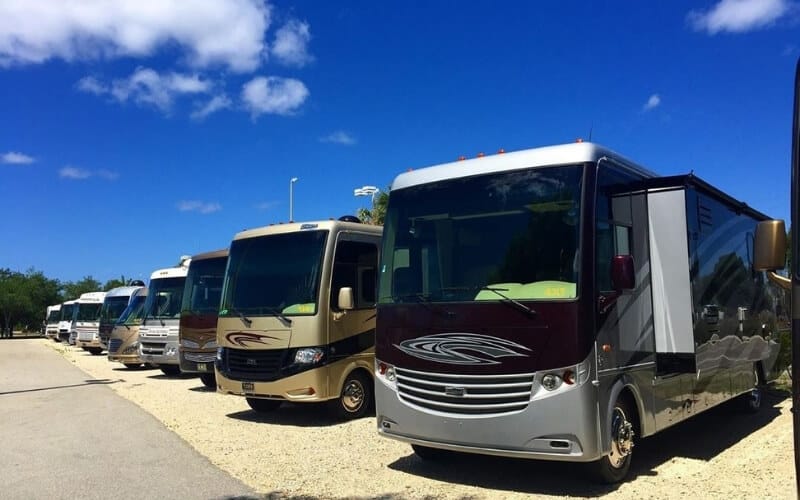
2: Shop Nationwide
It can also be a good idea to expand your search parameters for a new travel trailer to include the entire U.S.
And if you can locate where the manufacturers of the trailers you’re most interested in are located, look closely at the prices being offered by the dealerships within 100 miles of those locations.
In many cases, the dealerships closest to where a trailer is originally manufactured are able to offer the best deals.
This is because they have to cover minimal transportation costs in order to get the trailers on their lots.
When you consider that some dealerships pay as much as $2 per mile to have travel trailers shipped to their location, you can see why local dealerships are able to offer their trailers at lower prices.
So even if you end up paying a little extra in gas money to go pick up your trailer across the country, you may still come out ahead of the game in the long run.
3: Set (And Stick To) Your Budget
Once you have an idea of a handful of travel trailers you might be interested in, this will allow you to set a budget range for your trailer purchase.
When setting your budget, we actually recommend setting three prices that represent the minimum, maximum, and “best-case scenario” amount you’d be willing to pay for your new travel trailer.
The maximum will give you an idea of the most you’d be willing to pay for a travel trailer with all the bells and whistles you’d like most.
On the other end of the spectrum, the minimum number you set will help you avoid compromising too much, and ending up with a trailer that actually doesn’t suit your lifestyle.
Your “best-case scenario” budget number should fall somewhere between your minimum and maximum numbers.
This is what you’d ideally like to spend to get a new travel trailer that checks all of your boxes.
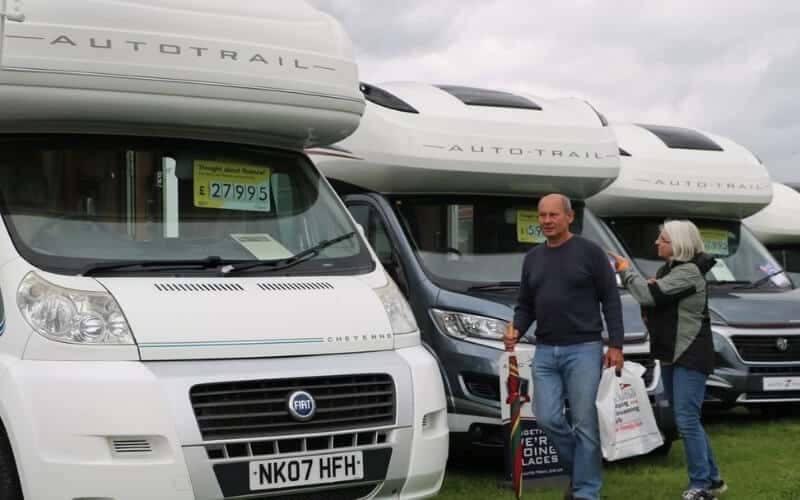
4: Avoid Buying On Your First Visit
When you start visiting dealerships or meeting private sellers, having the strength to walk away is going to be essential.
This tactic is one of the oldest negotiation strategies in the book because it’s highly effective.
In many cases, dealers or sellers won’t really feel the pressure to make a sale until you let them know that you’re willing to wait to find a better deal.
To be honest, this can be really difficult. Our impulses urge us to ‘get it done’ so that we don’t have to come back to the dealership and (seemingly) start the process all over again.
But you better bet that salespeople know this and they are going to work hard to get you to act on those impulses.
That’s why it’s helpful to be clear and honest with a salesperson upfront. Let them know that you’re just starting your shopping process (even if you’re not!) and your goal for the day is to visit several dealerships in the area to learn more about different trailer models and compare prices.
This will not only help you avoid dealing with an overly-pushy salesperson, but it will also put you in a better-leveraged position when and if it does come time to start negotiating.
It also leaves you wiggle room to change your mind about the exact features of the travel trailer you’re looking for before you narrow in on a model that might not be the best choice for you.
5: Prioritize Lightly Used Trailers
Buying brand new can be enticing and you better bet that salespeople at dealerships are going to steer you towards the newest trailers on their lot if you don’t demand otherwise.
Sometimes, dealerships will offer the best deals or financing on their newer models, but prioritizing lightly used trailers can be an excellent negotiating tactic.
This is because many dealerships will need to get older trailers off their lot in order to make room for next year’s models.
And this is especially true if you are shopping for a new trailer in the fall or winter rather than in the heat of the summer (when everyone else is too!).
It’s interesting to note that trailers are either traded-in or sold every three years, on average.
People’s needs change and that can put trailers with very minimal use right back on the dealership’s lot.
And you can be sure that those two or three-year-old models are going to come with a significantly lower price tag than this year’s brand spanking new trailers.
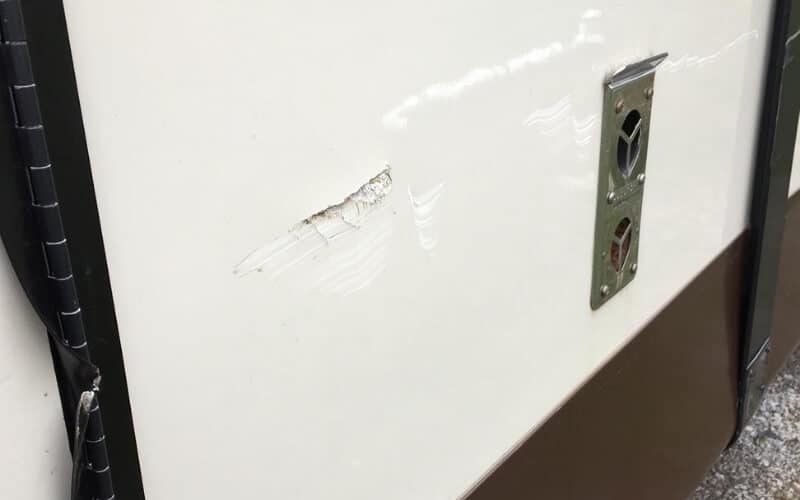
7: Inspect For Imperfections or Damage
This is especially important if you’re buying a used or pre-owned travel trailer. But it’s also a useful negotiating tactic if you’re looking for something brand new.
Even new trailers can have slight imperfections from the manufacturing process or small damage from being shipped from the manufacturing location to the dealership’s lot in your area.
That’s why it’s really important to thoroughly look through every nook-and-cranny of a travel trailer to see if there are any imperfections or damage that you’ll be able to leverage in the negotiation process.
For used travel trailers, you may even go so far as to request a full inspection from a third party.
Not all dealerships will agree to this, but it’s an essential negotiation tactic when you’re buying from a private party.
And it’s really useful if you’re buying your first-ever travel trailer and you’re not quite familiar with what exactly you should be looking for yet.
7: Utilize Multiple Dealerships
Pitting dealerships against one another is a great way to drive down the price of the trailer you want.
The strategy for doing this usually requires that you find the exact same trailer on two different lots.
And those trailers will typically have to be listed at different prices. That being said, we’ve known plenty of folks who have claimed to have a better offer from a different dealership even if that wasn’t necessarily true.
In fact, it’s possible to pit dealerships against one another when you’re comparing trailers with different floor plans or from different brands.
It’s all a matter of selling the fact that you’re ready to purchase a different trailer from a different dealer if the dealer you’re talking to doesn’t offer you a reduced price.
For instance, you tell the dealer that your budget is about $25,000. But, inevitably, the salesperson tries to get you into something that’s closer to $30,000.
You really do like the more expensive trailer, but you walk away and say you need to think about it. In the meantime, you find another trailer that’s ‘OK’ in your book but is listed at $23,000.
You return to the original dealership a week later and explain that you’re ready to settle for the other trailer for $23,000.
But you explain that the $30,000 is really your “dream trailer” even though it’s out of your price range.
Tell the salesperson you wanted to stop in before you buy that other trailer to see if there’s any last way they can get the price of your “dream trailer” down under your $25,000 budget.
This tactic has worked for many buyers of RVs, travel trailers, 5th wheels, cars, trucks, and just about any other high-ticket item you could purchase from a major dealership.
And it’s a great way to use the sheer number of dealerships out there to your advantage.

8: Consider Buying In Bulk
Ok, wait a minute, hear us out. We know you probably don’t need to buy two travel trailers, but many people have had success asking a dealership to cut you a better deal if you’re willing to buy two trailers. Of course, there are some prerequisites for using this negotiation strategy.
The best way to employ this strategy is to know someone else that is also currently interested in buying a travel trailer.
You’ll both need to be on the same page about the models of trailers you’re interested in, but there’s no reason you can’t both go to the dealership together to try this tactic.
If you’re financially flush and you have the money to buy a new trailer, you may also consider employing this strategy to get a discount on both models.
In some cases, you may even be able to turn around and sell your second trailer back to a different dealership or a private party for as much or more than you paid for it.
9: Compare Maintenance Fees
For at least the first year after you’ve purchased a new travel trailer, some maintenance fees and major repairs will be covered under the original factory warranty.
But smaller maintenance costs will come out of your pocket, which means it’s good to investigate the potential costs of maintenance before making a purchase.
Not all travel trailer dealerships will offer this, but some will provide deals on free or low-priced maintenance for a small period of time after you complete your purchase.
This can help you save on the long-term costs of owning and maintaining a travel trailer.
This is why, in some cases, it can actually make sense to purchase a more costly travel trailer from a dealership that offers free maintenance for the first year or two that you own the trailer.
And if the dealership you want to buy from doesn’t offer free maintenance, that lack of service may give you the leverage you need to negotiate a lower base price on your new travel trailer.

9: Offer To Pay Cash
Dealerships are almost always going to be willing to sell trailers at lower base prices for cash buyers.
While this isn’t always realistic for all buyers, offering to pay cash gives the dealership added assurance that they aren’t going to miss out on any of the money they’re owed for the sale.
If you must finance, the dealership has to be willing to accept the risk that you may default on payments at some point in the future.
Sure, they can always repossess the trailer, but its value will have depreciated significantly by then.
So they cover that risk by getting you to agree to a higher base price than they might be willing to offer if you’re able (and willing) to pay cash for your new trailer.
10: Negotiate For A Longer Warranty
If you can’t get the dealership to budge on the base asking price for the trailer you’re interested in, another good negotiation tactic is to get them to extend the length of the factory warranty.
A stunningly high percentage of new travel trailers and RVs will require major engine or mechanical repairs within the first two years of their lives.
Unfortunately, most original factory warranties will only cover the costs of these major repairs for the first year of the trailer’s life.
This is why many folks buying new or even pre-owned RVs or travel trailers opt to purchase an additional extended warranty from either the dealership or a private online vendor.
While you can always go that route, negotiating for a longer warranty when you’re first purchasing your travel trailer is a great way to avoid paying extra for a warranty later.
So even if you end up paying more for your trailer than you originally anticipated, you might be able to squeeze the dealership for an additional year or two of warranty coverage at no extra cost to you.
11: Seek Multiple Financing Offers
In many cases, the dealership’s financing offer won’t be the absolute best you can get.
There are many banks, credit unions, and private lenders that can offer you better financing terms than the dealership.
But knowing what financing offers you have on the table before you agree to purchase a travel trailer can also be a useful negotiation tactic.
This is because it will allow you to have a better idea of just what your long-term financial picture will look like if you buy a certain trailer.
Let’s give you some concrete figures to help illustrate this point:
1. Dealer A is listing a trailer for the asking price of $50,000
-
Their financing offer includes a 10-year loan term with a 4.5% interest rate.
-
You’ll pay more than $12,000 in interest over the course of the loan
-
That brings the total cost of your new travel trailer over $62,000.
2. Dealer B offers the same trailer at a lower asking price of $47,000
-
Their financing offer also includes a 10-year loan term, but at a 6% interest rate.
-
You’ll now pay more than $16,600 in interest of the course of the loan.
-
So that will bring the total cost of your trailer over $66,600.
As you can see, while the initial asking price of the trailer from Dealer B looked like you could save $3,000, you’ll actually end up paying more than $4,600 more for that trailer than you would if you bought from Dealer A with financing at a lower interest rate.
And while this is moot if you’re able to pay in cash, it illustrates the importance of seeking multiple financing offers when you’re negotiating a travel trailer purchase.
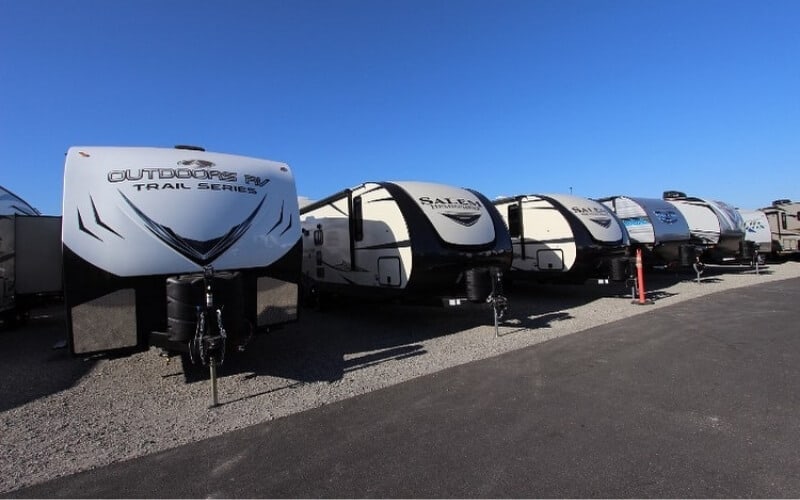
12: Search For Newer Dealerships
As you might imagine, dealerships that have just opened their doors in the last year or two are going to be under more pressure to get a return on their initial investment.
This means they may also be more likely to make sales at lower prices than their competitors, which you can use to your buying advantage.
Newer dealerships need to establish their reputation and making more sales is a great way to do that.
That also allows them to get more consumer feedback and online reviews that add to their level of credibility.
So buying from a newer dealership can often allow you to find the lowest price on travel trailers in your area.
13: Be Willing To Wait For Next Year’s Model
This kind of comes back to our original recommendation of exhibiting your willingness to wait for a better offer.
But if you do your research and you know your budget, there may be some cases in which you can actually get a brand new trailer at the same price as the year-old model the salesperson is currently trying to sell you on.
If you’ve done your homework and you’re certain this is the case, now is not the time to keep that information close to the vest.
Don’t be afraid to let the salesperson know that you’re aware of the market and the fact that you can get a brand new RV for that price if you’re willing to wait.
Explaining this lets the salesperson know you’re not a pushover and also puts the pressure on them to convince you otherwise.
And if you’re shopping for a trailer towards the end of the calendar year, the salesperson may also feel that added pressure to make a sale so that he or she can get that extra commission they’re looking for to cover holiday expenses!
14: Utilize Online Resources
There are a number of online resources that you should take advantage of when negotiating a travel trailer purchase.
For starters, NADAguides.com is the place to go to check the current market value of different travel trailer models. It’s sort of like the Kelley Blue Book for RVs, travel trailers, and 5th wheels.
Using NADA Guides will really only apply if you’re purchasing a used travel trailer, but it’s still an important tool.
It will help you know what the trailer you’re interested in is worth and what similar models have been selling for in your area, which will give you an obvious negotiation tool when asking a private seller why they have their trailer listed much higher than its listed value online.
Additionally, online community forums can be a great way to get up-to-date information on different travel trailers.
To find these forums, you can simply Google ‘[trailer make and model] forums’.
These forums contain stories and conversations about real users’ experiences buying from new and used trailer dealerships all across the country.
If you enter one of these forums, you can also get answers to any specific questions you have about buying a new travel trailer.
And those answers are going to come from real people who have succeeded (or failed) at negotiating a better price on their own travel trailer purchase.
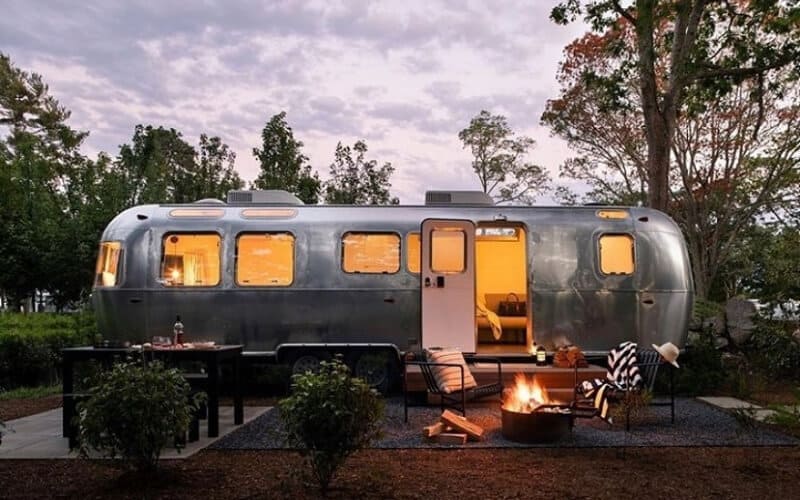
What Is The Markup On Travel Trailers?
In many cases, dealerships can mark up their travel trailers by more than 50%. This is because the cost to the manufacturer is usually less than half of the travel trailers listed market value.
This figure is actually quite shocking considering the fact that RV and travel trailer manufacturers seem to cut corners and find new ways to manufacture their RVs and trailers at lower costs every year.
So, if a trailer’s MSRP is $205,405, the dealer may stand to make as much as $136,936 on the sale.
In addition, certain manufacturers provide incentives to dealerships if they sell a certain number of units within a year, or if they are failing to sell certain units that have sat on their lots for more than a year.
Knowing this markup is essential to you as a buyer because it puts into perspective how much that extra $5,000 you want to negotiate off the sale price really means to the dealership in the long-term.
And understanding that manufacturers provide incentives to dealerships to reach annual quotas is just another reason to shop for a travel trailer towards the latter part of the year.
How Much Can You Negotiate On A Travel Trailer?
This will depend on how old the trailer is and where you’re buying it from. In most cases, you can actually negotiate for a higher percentage off the asking price when buying a new trailer from a dealership compared to buying a used trailer from a dealership or a private party.
Here’s a quick breakdown of how much you can negotiate on a travel trailer (based on percentages of asking price):
Buying New | Buying Used | |
Dealership | Up to 35% | Up to 20% |
Private Seller | Not Applicable | 25% or More |
Should You Rent Before Buying A Travel Trailer?
Yes! Renting several different trailers before deciding on the model you want to buy is always a good idea.
Take these trailers on similar trips to determine how you really like living in them for multiple days at a time.
And this will also give you an idea of what’s missing on certain trailers that would make your camping life easier.
There are many ways to rent a travel trailer to explore different models before buying.
You can go directly to dealerships and discuss what they offer in terms of leasing a trailer for a short period of time.
If you’re looking to rent directly from owners, Outdoorsy and RVShare are two excellent resources.
And renting from a private party also gives you the advantage of speaking to owners directly about what they like and what they’d change about their particular trailer.
Conclusion
Coming from someone that has purchased his fair share of questionable trailers, I can’t stress enough how important the negotiation process is when you’re making a travel trailer purchase.
Giving yourself a night (or two) to sleep on this kind of large purchase decision is never a bad idea either.
If you wake up in the morning and you’re still set on that trailer being your new mobile adventure home, then go for it! But you should still be sure to utilize these strategies for how to negotiate a travel trailer purchase so that you get the best deal possible.
And then you’ll have more money left over in your pocket for your trailer adventures!




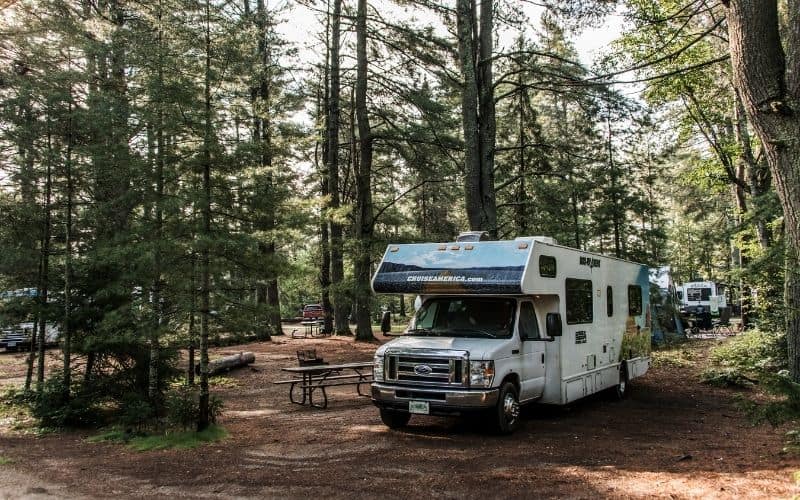

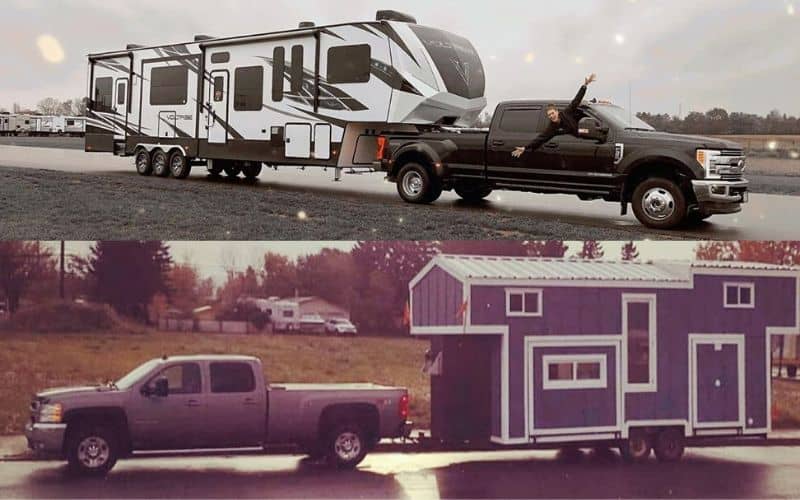
1 Comment
Eric S.
3 years agoI can say that a one or two year warranty is going to do much unless you are able to use the trailer quite a bit the first two years.
Also make sure you TV is more than capable to tow your trailer with your things in it, including water if your boondocking